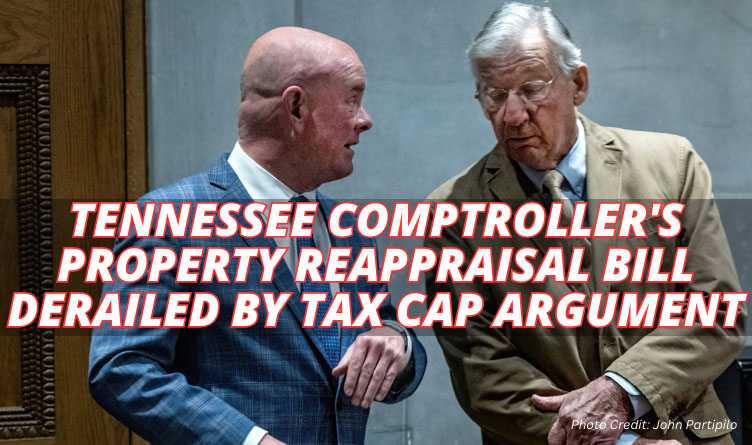House sponsor says he “let that sleeping dog lie.”
Photo: Tennessee Comptroller Jason Mumpower, left, with Sen. Frank Niceley, proposed a measure to expedite the property reappraisal process. Photo Credit: John Partipilo
By Sam Stockard [Tennessee Lookout– CC BY-NC-ND 4.0] –
A bill designed to expedite property reappraisals and keep counties from hemorrhaging revenue appears to have been caught in a battle over a measure to tamp down large property tax increases.
The Comptroller-requested reappraisal measure sponsored by Republican Sen. Page Walley of Savannah passed the Senate unanimously but got stuck in the House at the end of the 113th General Assembly.
The House sponsor, outgoing Republican Rep. Dale Carr of Sevierville, said on the last day of session he decided to “let that sleeping dog lie.” Carr held the bill on the clerk’s desk and never brought it up for a vote.

Reached for comment Monday, Walley indicated the reappraisal bill’s demise was connected to failure of another tax-related bill.
“I understood it may have been a victim of the House deciding that if the Comptroller and/or the Senate were not supportive of their proposal to cap local property taxes, that this should not advance either,” Walley said in a Monday text message.
Tennessee Comptroller Jason Mumpower proposed the legislation to expedite the property reappraisal schedule statewide after 38 counties lost anywhere from $100 million to $113 million two years ago in property tax collections, depending on the growth rate of property values.
Tennessee is suffering a housing shortage as tens of thousands of people move into the state, causing real estate prices to escalate. Yet real property is appraised by counties only once every four, five or six years. Mumpower wants to move that up to every two, three or four years.
But his bill fell on hard times, struggling to find traction in the session. Carr was forced to state repeatedly the measure was “revenue neutral” because counties are required to reset their property tax rate if they see an increase in appraisal values. State law prohibits counties from realizing a revenue windfall from reappraisals.
Mumpower, a former lawmaker who fell one vote short of becoming House speaker 15 years ago, would say only that, “Oftentimes, a complicated issue takes time to work through. More than anything, having served in the House, I respect the legislative prerogative to have the final say in any matter.”
He declined to speculate whether some lawmakers felt that expediting reappraisals amounted to an indirect property tax increase. Mumpower is expected to decide whether to file follow-up legislation after talking to officials statewide this summer.
Property assessors in high-growth counties say they lost money over the last two appraisal cycles because market values outstripped property appraisals by such a wide margin. An appraisal or sales ratio has to be applied in those cases.
Several fast-growing counties such as Rutherford, Davidson and Maury raised their property taxes in the last few years to deal with higher costs.
Yet lawmakers refused to pass a property tax cap bill proposed by supply-side economist Art Laffer, an advisor to multiple Republican presidents, who wanted to cap property tax increases at 2% except to pay debt and in cases when voters approved larger increases for a limited time.
Laffer contended that property tax increases cause property values to fall, mainly damaging urban areas and pushing personal income down over decades. TennCap, the economist’s new political group, started pushing the measure this year, spending heavily on a top lobbying firm to bring it passage.

Tennessee’s county mayors fought the measure, arguing it would hamstring their ability to deal with growth.
The Legislature’s Fiscal Review Office also disagreed with Mumpower and some lawmakers over the financial impact of the bill, saying it would create more than $100 million in unrealized revenue for county governments.
House Democratic Caucus Chairman John Ray Clemmons of Nashville said he believes the proposed bill stemmed from tax cuts for corporations and the state’s wealthiest 1% over the last decade that led to decreases in state revenue, putting a heavier burden on a “regressive” sales tax and local governments forced to deal with budget gaps by raising property taxes. The sales tax is considered “regressive” because it has a greater impact on people with less income.
“For anyone paying attention, this bill was an acknowledgement by the (Gov. Bill) Lee administration of the budgetary problem they’ve created for locals and a clear attempt by Republican leaders to facilitate more frequent property tax increases on working families,” Clemmons said in a statement.
“Fortunately, there were enough of us in the House that said ‘hell no,’” Clemmons said.
In addition to a large business tax break in 2023, the Legislature passed a $1.9 billion franchise tax cut and rebate this year, using the argument that the state faced “significant legal risk” from more than 80 companies that challenged the property value provision in the franchise tax. More than half of the money will go to out-of-state companies.


About the Author: Sam Stockard is a veteran Tennessee reporter and editor, having written for the Daily News Journal in Murfreesboro, where he served as lead editor when the paper won an award for being the state’s best Sunday newspaper two years in a row. He has led the Capitol Hill bureau for The Daily Memphian. His awards include Best Single Editorial from the Tennessee Press Association. Follow Stockard on Twitter @StockardSam




3 Responses
Serious consideration should be given to the tax ap law, Prop 13 of California, which stopped the out of control property taxation in that state. They money was going to the pockets of the politicians and their funders instead of the schools and the infrastructure of the state. The property taxes were raised without vote at huge percentages that only grew the government (which continued as they raised other taxes instead). Taxation is a form of slavery; proper management of monies fed to the coffers must be enforced, elimination of gratuitous salaries, union payoffs, retirements, etc., will eliminate much of the need to over-tax property owners.
Failure of this bill is obviously short sighted. I am happy to explain to any legislator or citizen why Prop 13 tax caps are smoke and mirror and are designed to benefit big business, not the average taxpayer. Politicians should learn to listen to those that actually do this for a living and not to politicians who are looking for campaign contributions.
To understand the potential dangers of Proposition 13 for Tennessee, we must consider the unique fiscal and constitutional context of Tennessee. Unlike California, Tennessee’s constitution deliberately limits onerous taxation and demands equity and uniformity in assessments which could make the adoption of a Prop 13-like amendment particularly risky for the state’s local markets and government stability.
Proposition 13, enacted in California in 1978, capped property tax rates at 1% and limited the annual increase in assessed value to no more than 2% unless the property changed ownership. While this policy initially reduced property tax revenue, it also led to unintended consequences, such as increased residential home values and a shift in tax burdens away from commercial and industrial properties.
Tennessee’s constitution contains provisions that restrict the imposition of burdensome taxes. This includes a prohibition on income taxes and a requirement for uniformity in property tax assessments. These restrictions reflect a commitment to fiscal conservatism and a balanced approach to taxation.
If Tennessee were to implement a Proposition 13-like amendment, the following risks could emerge:
1. Reduced Flexibility in Revenue Collection:
Tennessee’s existing constitutional limits on taxation mean that the state already operates with a leaner tax structure. A cap on property tax rates could further constrain local governments’ ability to raise revenue, especially during economic downturns, leading to potential cuts in essential services.
2. Increased Volatility in Local Markets:
By artificially suppressing property tax rates, Tennessee could experience a distortion in its real estate market. This could lead to inflated home values, making housing less affordable and potentially contributing to a property bubble.
3. Shift in Tax Burden:
Similar to California, a cap on property taxes in Tennessee might shift the tax burden to other forms of taxation, such as impact fees, user fees, special assessments or sales taxes, which are more regressive and can disproportionately affect lower-income residents.
4. Impact on Government Stability:
The stability of local government finances could be jeopardized, as they would have to rely more heavily on variable sources of revenue, such as state aid or special assessments, which are less predictable and can fluctuate with the economy.
While Proposition 13 has had complex effects on California’s fiscal landscape, its implementation in Tennessee could pose significant risks. Given Tennessee’s constitutional commitment to limiting taxation, a Prop 13-like amendment could reduce the financial flexibility of local governments, destabilize local markets, shift tax burdens in regressive ways, and threaten the long-term stability of government operations. It is crucial for Tennessee to consider these risks carefully before contemplating any similar tax cap measures.
The potential implications of Proposition 13 for Tennessee, considering the state’s unique constitutional and fiscal environment. It is important to note that while Proposition 13 has been a subject of debate in California, its adoption in Tennessee could have very different and potentially more harmful consequences.